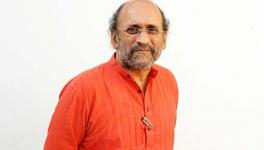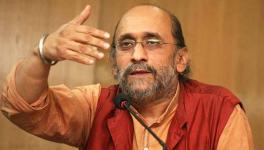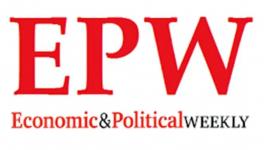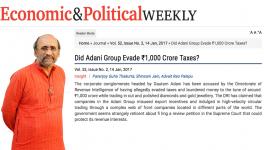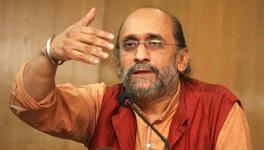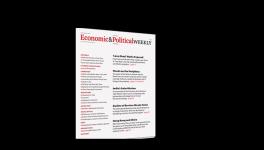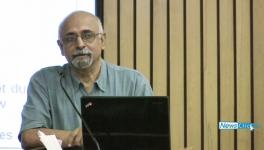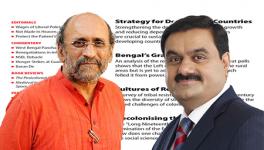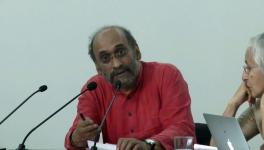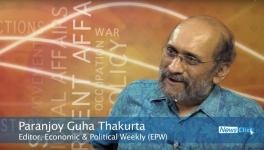Former EPW Editor Ram Reddy's 2016, Letter to the Sameeksha Trust
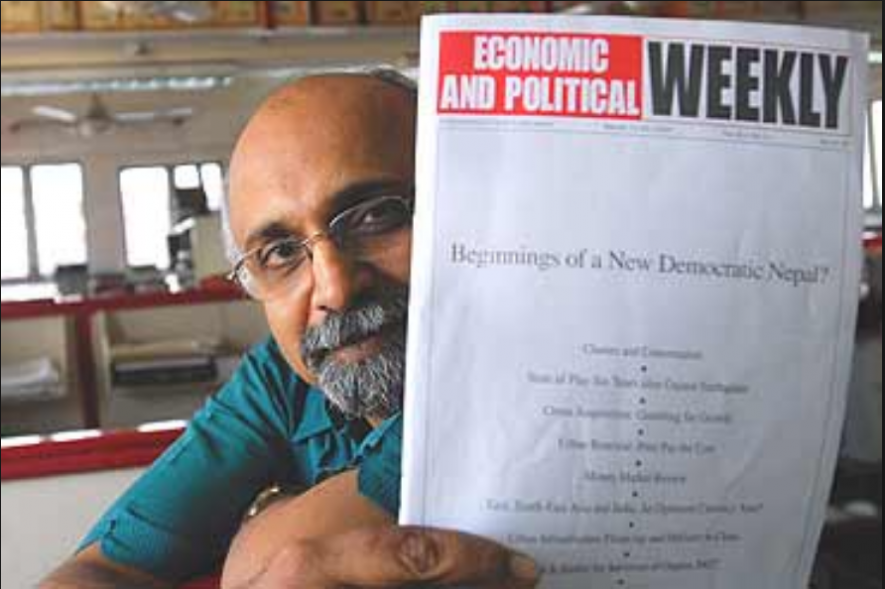
Image Courtesy : Outlook
The controversy over the resignation of Paranjoy Guha Thakurta as Editor of EPW is only 15 months after C. Rammanohar Reddy left the journal as Editor in less than happy circumstances. Newsclick believes his letter, written to the Trust on 19th February, 2016 is important for the EPW community. We are carrying this letter and also the letter written by a number of eminent people who considered themselves a part of the EPW community.
9 February 2016
Mumbai
EPW will have a new Editor on 1 April. Paranjoy Guha Thakurta, who will take over on that day, will be a fine Editor and he will, I am sure, make EPW even more of a lively and high quality journal than it now is. I look forward to working with Paranjoy on a handover. Once the transition is completed at the end of March, my formal connection with EPW will end.
All of us would like to draw a line and look ahead, a part of the looking ahead must be about how to do things better.
A large number of members of the EPW Community (I think it has to be a capital “C”) had suggested in their letter of 15 February to the Trustees of the Sameeksha Trust, the publishers of EPW, that I should be (a) involved in the search for a new Editor, (b) permitted to carry through the initiatives I had taken to mark the 50 years of publication of EPW, and (c) continue to be involved in a significant manner with EPW in the future. The Trustees did not respond to this request.
There were other letters and statements as well, all of which I too, as an ex-officio trustee, received.
I do not think there has been any reply to any of these letters/statements either.
The request to involve me in the selection of a new Editor is no longer relevant. On the others, I do not want it to be thought I am trying to carve out a role for myself in EPW in the future. I am therefore using this opportunity to let you know that (i) I do not seek any formal position with EPW and (ii) I also do not seek a position with or on the current Board of Trustees of Sameeksha Trust. It therefore follows that I do not wish to (or can) execute the plans that I had made in 2015 to mark 50 years of EPW.
As one of the letters to the Trustees notes, the 50th anniversary is a time to celebrate and also an occasion to think about how we may need to do things differently and for the better.
I would like to briefly touch on some of the questions the EPW Community has posed on one specific aspect: the working of the Sameeksha Trust.
Before that another matter. Many of you have wanted to know the details of the disagreements between some of the Trustees and me. I have spoken about it in broad terms in two press interviews. No purpose is served by writing about it in detail. My correspondence with the Trustees and the minutes of meetings from February 2015 onwards set everything down, both about the 50th anniversary events and my (earlier agreed) post-April 2016 future at EPW. I would like to, however, share with you a brief discussion I had a fortnight ago with a former Trustee.
Cause of Disagreement
Prof. Amit Bhaduri was a trustee of the Sameeksha Trust until last year. (He had wanted to resign from the trusteeship for a few years. One of the reasons for this, he often said, was to make room for younger Trustees.)
Prof. Bhaduri was not aware of all the facts relating to my disagreements with the Trustees. But when I met him, he asked me one question and made one observation, which, in two brief sentences, encapsulate all that happened. The question: "Was the issue about domain control?" Yes it was. The observation: "I had told you many times that you were soft-spoken, if not quiet, with the Trustees. You needed to be assertive". I had forgotten Prof. Bhaduri’s advice; I had even earlier not acted on it. Indeed, in retrospect, this “soft-spokenness” seems to be the second reason for whatever happened on the eve of my departure. But this is supposed to be EPW, where how you express yourself is not supposed to be important; only what you said was supposed to be.
Public or Private Trust?
To return to what I think are the core issues. There appears to be a view that the Sameeksha Trust is a “private” trust and is therefore not answerable to the “public”, or “outsiders”. This is wholly incorrect, legally and substantively.
A private trust is one that is formed for the benefit of a small group of persons, usually a family and usually as a tax shelter; a public trust is one that works for the benefit of the larger community. The Sameeksha Trust does not fall under the first category; it is formally constituted under the second. It is registered under the Bombay Public Trust Act of 1950 which covers, among other things, trusts set up for charitable purposes including education.
The main objects of the Sameeksha Trust, as outlined in the trust deed drawn up in 1966, are to promote the study and advancement of knowledge, publish journals, help institutions conduct teaching, and the like. Its work over the decades has been to be an avenue for dissemination of research, a forum for debate on current affairs and to work for education in the social sciences. The Trust also enjoys tax exemption under Section 80G of the Income Tax Act for donations made to its corpus; it is therefore answerable to the public.
Public trusts cannot claim a privatized existence. It is hoped that the Trustees of Sameeksha Trust will not make this argument to resist engagement with scholars, readers, writers and the larger body public itself, all of whom constitute the EPW Community. If they do hold on to this argument it is the responsibility of the EPW Community to convince them otherwise.
Towards Change
Much of what EPW editorializes on and has stood for is for our institutions to be more democratic in their functioning. Indeed, a longstanding tradition at EPW, going back to the days of Sachin Chaudhuri, has been of openness and democratic functioning. We do have hierarchies in EPW but they are formal; in our work we attempt to relate with each other as equals. There are disparities in our salaries, but they have always been narrow. In physical design as well, our offices have always been open – no individual rooms, closed doors or walled partitions. While we certainly need to do much more, we try to adhere to the principles we call for in the pages of EPW. It is therefore time for the Sameeksha Trust too to look at a way of functioning that is democratic and open to interaction with the public, the very people who have made EPW what it is.
It would be in keeping with the spirit with which EPW was set up that the rules drawn up in 1966 (as embodied in the trust deed) are reexamined in 2016 and changes made where necessary to enable the Sameeksha Trust to perform its role in vastly different circumstances and with a very different EPW than when born in 1966..
I would like to write about two sets of areas of change that need to be made. One is to institute a mechanism for a substantive and may be even formal interaction between the Sameeksha Trust, the Editor of EPW and the EPW Community. The second, and in some ways related to the first, is for an overhaul of the norms and practices for selection of Trustees and duration of terms.
(i) Consultative Body
As one set of correspondents has suggested in its letter:
it could be of … value if the wider ‘EPW community’ of scholars were … given a platform to interact with the Editor and … Trustees … through the establishment of an ‘Interactive Consultative Body’, comprising a dozen or so members drawn from the community of scholars, and chosen by the Trustees in consultation with the Editor. [Such a body] can assist with realizing the Trust’s broad vision of furthering the cause of the social sciences amongst its community, by making available its knowledge and experience toward expanding the outreach of EPW.
Such an advisory body could channel suggestions from the EPW Community to the Editor and Trustees, listen to what the Trustees and Editor have to say, and respond to the Editor’s requests on editorial and other matters. How such a body should function, whether it should be a purely advisory body or be endowed with some powers and how it should be constituted, should all be matters for discussion between the Trustees and the EPW Community.
Elsewhere in the world there are trusts which publish newspapers and magazines, and we can study their experiences in order to strengthen the Sameesksha Trust-EPW arrangement.
One well-known example is of the Scott Trust which oversaw the publication of The Guardian in the UK for 70 years. The Scott Trust became a limited company in 2007 and continues to perform the same role as before. It is the sole shareholder of the Guardian Media Group and its main objective is to secure the editorial and financial independence of The Guardian.
Given that the Sameeksha Trust still has only a relatively modest amount of financial reserves and that it has not paid adequate attention since 2007 to increasing its corpus, the working of the Scott Trust in this area (and in others) is something worth learning from. This is only one example; there are many others which would be worth studying.
(ii) Constitution of Board of Trustees Sameeksha Trust.
In a detailed letter I sent to all Trustees of the Sameeksha Trust on 4 January, I listed, based on my experience of working with the Board of Trustees since 2004, what I believe are important issues relating to the constitution of the Board of Trustees that needed to be addressed. Let me mention a few of the more important issues I had highlighted:
(a) We need to think of the expertise and skills the Trustees should have in order to be able to guide EPW (for example the need to have serving members of the academy, and also persons with experience in/knowledge of each of the following areas: academic publishing, media and the digital world),
(b) We need to give thought to having a Board of Trustees which is diverse in its composition,
(c) We must lay down the duration of each term of the Chairperson and Trustees (there are now none), and
(d) We must have term limits for the Chairperson and Trustees (again none at present).
On the activities of the Trustees itself, I listed what I felt was one important proposal, related to the earlier point about the imperative to secure the financial independence of EPW:
We need to have a standing committee comprising a few Trustees and a few external members which would work on mobilizing funds for the corpus of the Sameeksha Trust on a continuing basis. The past few years have been, in financial terms, reasonably good for EPW, but there is no reason to expect that this will continue. Hence the need to steadily augment the corpus.
I did not receive a reply to my letter of 4 January. Here again it is I think the responsibility of the EPW Community to convince the Board of Trustees to discuss these issues and effect changes.
There are other important areas where we need a discussion. One such is the process of selection of Trustees. The consultative process needs to be much more widespread than at present, perhaps the selection process needs to be even formalized in some manner.
Allegations of Impropriety
Finally, yes, it has been a very difficult time for me and my family over the past several months. It is only now that I am beginning to restore some order in what I do. As difficult as it was, I did not think ever, that there would be suggestions/innuendo of financial impropriety levelled at me. But
there have been and please allow me to address at least the two I have heard, which many of you too may have.
(a) One story is that The Editor drew on EPW funds without prior authorization to incur expenditure on his initiatives to mark 50 years of EPW. The facts: Not one paisa has been spent from EPW’s funds on any of the plans I had drawn up. Not one paisa was spent even from the grant applied for and received from the Tata Trusts to implement these plans. Once the controversy erupted I put everything on hold.
(b) Another story that has been in wide circulation in Delhi and elsewhere is that there was a conflict of interest involving me because I had planned, again as part of the 50 year celebrations, for EPW to jointly publish a three-volume history with the publishers Orient BlackSwan (OBS) with which my wife is associated. Indeed, my wife is a director at OBS. But the facts: (1) Following a discussion on December 4, 1995 at a meeting of the Board of Trustees (some of whose members are Trustees today as well), Krishna Raj, then Editor of EPW, and what was then Orient Longman (since renamed as OBS) signed an agreement to jointly publish books. This was nine years before I joined EPW, (b) When the publication programme was revived in 2010, I mentioned my personal links to OBS at board meetings on more than one occasion. I was told each time that this was not an issue that needed to be addressed.
For someone who, over the past 10-12 years, has spent so much time and effort on shoring up EPW’s finances, these accusations are, to put them mildly, extremely unfair.
I will not be able to address every such allegation that may follow me from now on. But I would be grateful if you could bring at least these two sets of facts to the attention of those who you may hear mentioning these issues.
In Conclusion
I would like to end on a very positive note by sharing with you the incredibly deep sense of support, warmth and gratitude that has been expressed by a very large number of members of the EPW Community in recent weeks.
The support of all those to whom I am sending this letter has, of course, been overwhelming. All of you expressed your views immediately and, as I said, in complete trust.
I would also like to share with you the fact that a letter of immense affection that all my colleagues at EPW have written to the Board of Trustees, where they write at length about how much they have valued working with me over the years and how much I mean to them. I was not embarrassed by that letter; I was humbled to see that my colleagues held me in such esteem.
Readers and writers of EPW – far too many to count and many of whom I neither know nor had corresponded with earlier -- have also written thanking me deeply for what my colleagues and I have done in EPW over the past dozen years. These letters from students, teachers, researchers, public personalities, former colleagues and many “unknown” readers and contributors have praised the EPW we know today.
I am overwhelmed and humbled yet again, by the fact that all of them consider our work since 2004 to have been outstanding.
I cannot ask for more.
Thank you again.
Warmly,
Ram
Get the latest reports & analysis with people's perspective on Protests, movements & deep analytical videos, discussions of the current affairs in your Telegram app. Subscribe to NewsClick's Telegram channel & get Real-Time updates on stories, as they get published on our website.









